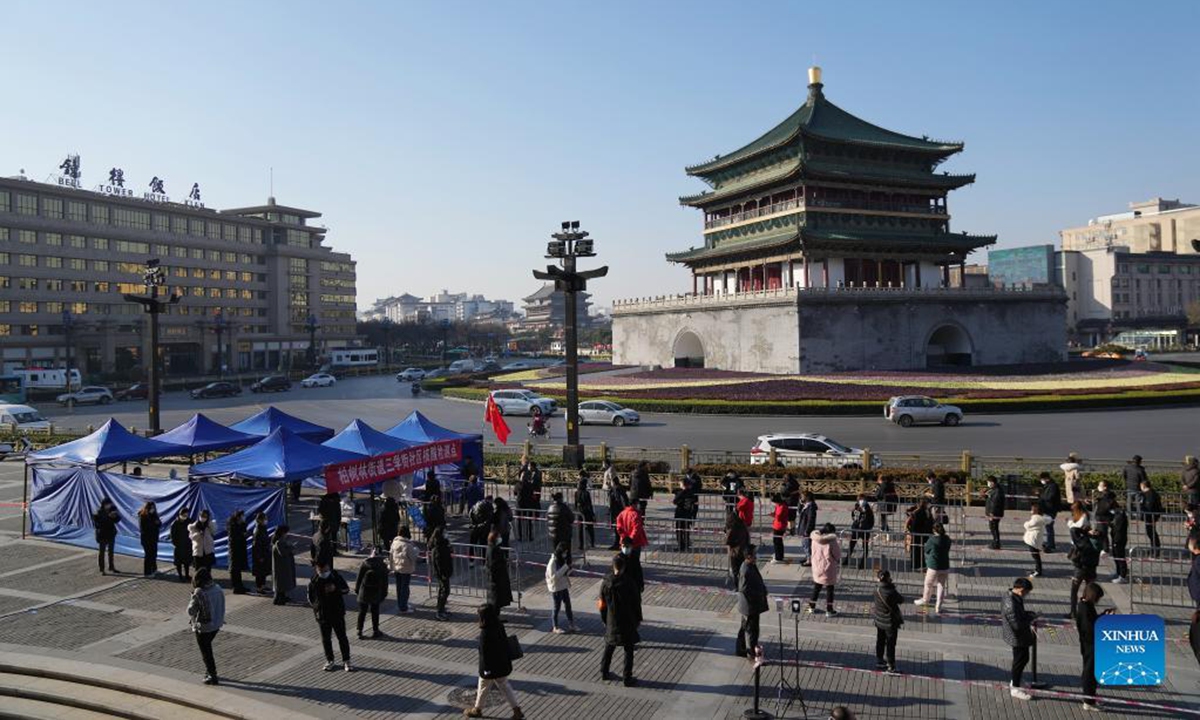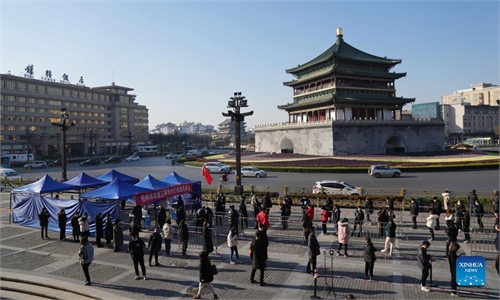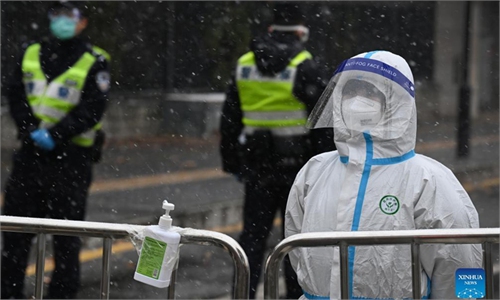COVID-hit Shaanxi advises migrant workers to stay put
Medical experts express faith in curbing virus spread in 2-4 weeks

Residents queue up for nucleic acid test at a testing site in Xi'an, northwest China's Shaanxi Province, Dec. 21, 2021.Photo: Xinhua
Northwest China's Shaanxi Province, torn by an ongoing epidemic flare-up, has told rural migrant workers to stay put during the New Year and Spring Festival holidays. This comes after the province locked down its capital city of Xi'an earlier amid a recent coronavirus spike that registered nearly 500 cases in two weeks.
But experts expressed faith in curbing the latest outbreak in two to four weeks, noting that while the infection number may be higher, the cases are less concentrated than in previous rounds and anti-epidemic measures are being put in place in an orderly and timely manner.
"If out-of-town workers and students return home for the two holidays, there exist the potential risks of epidemic spread in rural areas, and our current focus is to prevent such spillovers," said Zhang Ying'an, a vice head of the agricultural department of Shaanxi, at Saturday's media briefing.
The province saw another 157 local confirmed cases on Saturday, 155 of which were found in Xi'an. Since the latest spike hit the province on December 9, a total of 499 locally transmitted cases were detected, and 485 of them were from the capital city, home to about 13 million people.
Fueled by the Delta variant, four patients have developed severe symptoms, according to local health officials, and the youngest is a 1-year-old child.
Xi'an tightened travel controls and locked down communities on Wednesday. To curb the outbreak, the city sealed off 235 communities involving nearly 140,000 people.
Drawing lessons from its "chaotic" epidemic response as described earlier by many local residents, the city has implemented lockdown work in a more orderly manner.
December 25 not only was Christmas Day, it was also a big event for many Chinese students - the national post-graduate entrance examination, which saw some 4.6 million applicants this year. Amid this, an applicant in Xi'an who tested positive for COVID-19 and was being treated at a local hospital, received special care. The applicant took the exam in his quarantine ward with two medical staff watching over him throughout the process.
A local resident surnamed Ma, whose wife had secondary contact with a positive case, told the Global Times on Sunday that while he has been asked to quarantine at home for 14 days, he and his family stayed calm.
Ma said that the prices of life necessities have gone up slightly, but are expected to drop soon, and food and daily supplies have remained sufficient.
In an effort to avoid overpricing or hoarding by using the epidemic as a reason, the market regulation administration in Xi'an on Saturday imposed severe fines of up to 50,000 yuan ($7,852) on businesses found to have such violations.
Citywide disinfection will be in place starting from Sunday at noon, local health authorities announced.
So far, the outbreak has affected six places in five provincial regions, including Xianyang and Yan'an in Shaanxi, Zhoukou in Central China's Henan Province, Dongguan in South China's Guangdong Province, and Beijing.
Media reports said that the current resurgence in Xi'an involved multiple unclear infection chains and cases were found in multiple districts, indicating that there were complex transmission chains that made the tracking and identification of close contacts more difficult.
However, experts expressed confidence in bringing the epidemic under control in two to four weeks, despite a reminder from local authorities on Sunday suggesting more cases are expected to be found in the coming days.
A Beijing-based immunologist told the Global Times on condition of anonymity that while infection numbers may be higher than previous rounds in other places - given that the freezing winter gives more chances for the virus to survive - Xi'an's anti-epidemic measures are being taken at an early stage, and they haven't found cluster infections.
Still, there's complexity in identifying the origins, health experts said. Under such circumstances, it is best for cities around Xi'an to combine large-scale epidemic prevention with targeted measures, they said.



